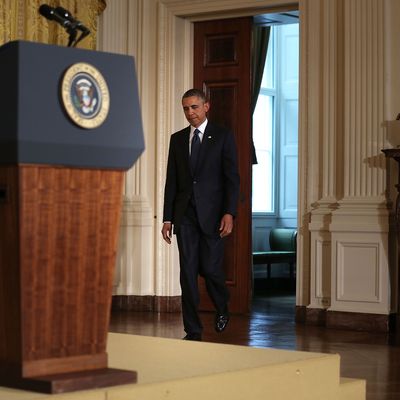
Sifting through the Republican responses to President Obama’s climate speech Tuesday, an odd omission could be found — or, at least, it would have seemed odd as recently as a week or two ago. The various Republican statements churned out for the media dutifully denounced the president as a job-killing, coal-hating, stealth-taxing liberal. See Mitch McConnell, John Boehner, Rand Paul, Orrin Hatch, the National Republican Senatorial Committee via spokesblogger Jennifer Rubin, and any others you care to Google on your own. The word that never appears in any of them is scandal. Not a one of them claimed Obama was attempting to distract America from his scandals.
It is not that Republicans have previously shied away from bringing “scandal” in to putatively unrelated Obama doings. The existence of a presidential “scandal” can be inferred when the opposition party — and both parties do this — attempts to tie the scandal to anything the president does or does not do. Republicans have previously defined as attempts to distract from the scandal such disparate Obama actions as nominating judges, proposing to reduce student loans, visiting the Jersey Shore, and defending the use of drones. That is to say, basically everything Obama has done since the dawn of the Obama scandal era about seven weeks ago. If the president can give a major speech without either the opposition or the new media accusing him of attempting to distract from the scandal, then the scandal is over.
Do you remember how all-consuming the “Obama scandals” once were? This was a turn of events so dramatic it defined Obama’s entire second term — he was “waylaid by controversies,” or at least “seriously off track,” “beset by scandals,” enduring a “second-term curse,” the prospect of “endless scandals,” Republicans “beginning to write his legislative obituary,” and Washington had “turned on Obama.” A ritualistic media grilling of Jay Carney, featuring the ritualistic comparisons of him to Nixon press secretary Ron Ziegler, sanctified the impression of guilt.

It has come and gone, having left barely a trace. To be sure, the Obama scandals live on in the conservative world, where the evidence of deep corruption and venality grows stronger and stronger. But that is merely the confirmation of suspicions of “Chicago politics,” ACORN and so on, that predate recent events and don’t require any particular facts to survive.
The IRS scandal is instructive. The most damning moment of the episode was the first day, when the IRS disclosed that it applied one-sided scrutiny to conservative political organizations seeking tax-exempt status. “Obama Supporter Has Perfectly Improbable Explanation Absolving President From Blame For Scandals,” mocked The Onion. Jon Stewart lost his shit:
But then the IRS inspector general, a Republican, reported that the entire program came from within the agency, with no direction at all from Obama or any members of his team. It was just an agency scandal. Subsequent revelations have made the matter look even more benign. Apparently, the agency also targeted liberal groups for possible violations, using terms like progressive to flag political groups. In other words, there may be no scandal here at all. The IRS was looking to make sure political groups weren’t abusing the tax code by pretending to be nonpolitical, and it tried to search for such abuses by using terms like tea party and progressive that would signal partisanship.
Why did we think the agency was targeting only conservatives? Because apparently Darrell Issa, chairman of the House Oversight Committee, ordered the agency to audit its treatment of tea-party groups, and only tea-party groups. The IRS dutifully reported it was indeed targeting tea-party groups; everybody assumed it was doing no such thing to liberal groups. The IRS inspector general is defending its probe, but the IRS’s flagging of conservative groups seems, at worst, to be marginally stricter than its flagging of liberal groups, not the one-sided political witch hunt potrayed by early reports.
What about the rest of the scandals? Well, there aren’t any, and there never were. Benghazi is a case of a bunch of confused agencies caught up in a fast-moving story trying to coordinate talking points. The ever-shifting third leg of the Obama scandal trifecta — Obama’s prosecution of leaks, or use of the National Security Agency — is not a scandal at all. It’s a policy controversy. One can argue that Obama’s policy stance is wrong, or dangerous, or a threat to democracy. But when the president is carrying out duly passed laws and acting at every stage with judicial approval, then the issue is the laws themselves, not misconduct.
The whole Obama scandal episode is a classic creation of a “narrative” — the stitching together of unrelated data points into a story. What actually happened is this: House Republicans passed a twisted account of a hearing to ABC’s Jonathan Karl, who misleadingly claimed to have seen it, creating the impression that the administration was caught in a major lie. Then the IRS story broke, which we now see was Republicans demanding a one-sided audit and thus producing the impression of one-sided treatment. In that context, legitimate controversies over Obama’s civil-rights policies became the “three Obama scandals,” exposing a government panopticon, if not a Nixonian administration bent on revenge.
The collapse of the Benghazi story happened very quickly, when Jake Tapper’s reporting found that Karl had peddled a bogus story. (It’s notable that the only misconduct in both the Benghazi and the IRS stories was committed by House Republicans.) But the scandal cloud lingered through the still-extant IRS scandal, which in turn lent the scandal odor to the civil-liberties dispute. Now that the IRS scandal has turned into a Darrell Issa scandal, we’re left with … an important dispute over domestic surveillance, which has nothing to do with scandal at all. The entire scandal narrative was an illusion.






























